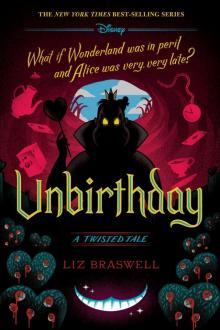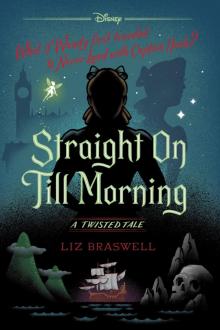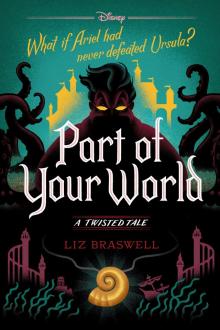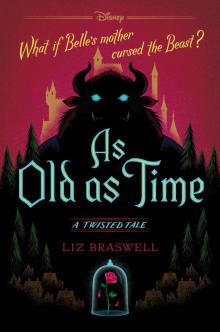- Home
- Liz Braswell
Part of Your World Page 3
Part of Your World Read online
Page 3
I will send out tablets with the details, posted in the usual public locations, she signed wearily. That is all.
After her helpers spoke and everyone thought about it for a moment—it was like waiting for the thunder after lightning, watching the meaning of her words sink in seconds later—the crowd made murmurs both negative and positive, and began to disperse.
Ariel sat back in her throne, leaning tiredly on one elbow, unconsciously assuming the exact position her father always had at the end of an exhausting day. Threll darted from one lingering mer to the next, making sure everyone understood and felt like she or he had been heard. He was a good little messenger, and had proven surprisingly useful in his new role. Flounder was in the back, having a low conversation with a fish she didn’t recognize.
Sebastian came scuttling over to her, kicking himself up through the water to sit on her armrest.
“Ah, the Saga at the end of the Rites will be outstanding this year,” he declared, parading back and forth in front of Ariel, claws gesticulating in the air. “So much talent. So much enthusiasm! Nothing could make it better. The sardines are in sync, the trumpet fish are terrific. Everything is perfect. Well, there is one thing that could make it better, of course…if only you had your lovely voice.”
Ariel raised an eyebrow at Sebastian. Even if she had her voice, she doubted very much if she could have said anything that would have successfully interrupted his monologue. She shifted uncomfortably in her throne. The little crab didn’t notice. Although he could expertly interpret her signs, read her lips, and decipher her moods—it was only when he was paying strict attention.
“Ahh, what a loss that was for de world….” He put a claw on her shoulder and finally noticed her scowl. “Er, of course, in return, we received the best, most excellent queen in de world.”
The best, most excellent queen in the world tapped her trident, idly considering turning him into a sea cucumber for a few minutes to think about what he had said.
But he was only echoing something Ariel thought about all the time, herself: whether or not she was any sort of decent queen. Since she never should have been queen to begin with.
When she had returned to her sisters five years before, voiceless and deep in despair over what had happened to her, she’d fully expected banishment, punishment—at the very least, severe chastisement. Instead her family did something utterly unexpected: they made her ruler over all of Atlantica. There was no precedent for this; as the youngest child of the mer-king it would normally have taken the deaths of all six older sisters before the crown came to her.
“You’re responsible for the murder of our father,” they had said. “It’s only right that you take on his burdens.”
Privately Ariel wondered if it was less punishment for her than a relief for them. None of her sisters wanted the job. As royal princesses they could sing and play all day, dress up in fancy shells, wear crowns, oversee dances and parades and balls…and never actually have to do any real work. These days she often watched her sisters laughing and singing and wondered at the gulf that had grown between them. Here she was, the youngest, some would say the prettiest—at one time perhaps most thoughtless of the lot—and now she sat on a throne, envying them.
The merfolk adored their queen despite her silence and melancholic air. Or perhaps because of it. Mer poets and musicians wrote odes and epics to the tragedy of her existence, the romance that had almost caused a kingdom’s downfall.
She did not enjoy these.
She did not enjoy the attention of the mermen, either. Once upon a time, as a younger, more innocent thing, she had never even noticed boys. Mer boys, at least.
Now she was forced to notice them, to keep an eye on them, to be aware of what ulterior motives they had: to wed the queen, maybe to become king.
Ha, she thought bitterly. If only they knew what a pain it is to rule.
She hadn’t been even a tide-cycle into her new office before she had begun to understand her father’s temper and moods. He had been a firm leader who rarely smiled, presenting the perfect image of an old god: stony-faced, bearded, permanent. Prone to glowering and frowning. She and her sisters always teased him, trying to win smiles from him, trying to get him to steal an hour from his duties to play with them. Mostly they had to content themselves with his presence at official functions, banquets, and performances like the one Ariel had skipped—the one that had started the whole thing.
She wished she could tell him she understood. Being a ruler was hard. It made one frown, turn pensive, grumpy.
It should have been an easy job; the merfolk and their allies were the happiest, most carefree peoples in the world.
Well, until a tribe of branzinos moved a little too close to the viewing garden of a royal cousin.
Or the shark-magister insisted on expanding his people’s hunting rights all the way to Greydeep Canyon.
Or, far more importantly, a reef suddenly turned white and died for no apparent cause. Or the diamondback terrapins couldn’t make it to their favorite nesting place because there were houses there now. Or the humans had managed to catch—and eat—an entire delegation from the northern seas. Or the number of fishing vessels was getting too large to ignore, to relegate to the unwritten and ancient Dry World–Sea World laws of yore.
Yet despite these much more pressing concerns, cousin Yerena still complained about the branzinos and her garden and “their ugly faces.”
It made Ariel irritable just thinking about it.
Besides general grumpiness, there was another more serious similarity between the king and his daughter. Any joy Triton had taken in life, even with his daughters, was constantly shadowed by sorrow over his dead wife.
Any respite Ariel took in her new life was constantly shadowed by her sorrow and guilt over her dead father.
And so she ruled, firmly and well, but silently and with much melancholy.
She cleared her throat, one of the few noises she could still make, and was leaning forward to give the little crab a piece of her mind when Flounder came swimming up.
Her old friend was larger and happily fatter than when they had first set out to the surface years ago. He had a medallion around his neck to show rank; the imprint of the trident meant he was in the innermost ring of the royal circle. But unlike the adorable little helper fish and servant seahorses, he didn’t turn his chest into the light or waggle to make the golden disk extra obvious. He remained, despite the years and accumulated wisdom, likable, down-to-seafloor Flounder.
“My Queen!”
He swooped in front of her, ignoring Sebastian, and gave the low bow that was required of all but Ariel usually tried to stop—at least from him and Sebastian.
Ariel cocked her head at him: go on.
“I’ve just had some strange—really, really strange—news from a plaice, who heard it from a turtle, who heard it from a dolphin….Wait, I think it was the plaice from the turtle. There might have been another messenger in between. A bluefish, maybe?”
He felt Ariel’s impatience before she even displayed it.
“There is a seagull on the surface who claims to have news for your ears only.”
Ariel’s eyes widened.
She signed carefully, spelling out the name.
Is it Scuttle?
“No, My Queen,” Flounder said, trying not to show his own disappointment. “It was hard to make out through all of the…parties involved, but I believe it is a younger one, and a female.”
Ariel practically wilted.
Seagulls were useless. Scuttle was a rare bird. Scattered but goodhearted, prone to flights of exaggeration, but a true friend. It should have been him coming to visit.
For several years after the day she lost her father, Ariel had tried to return to the land to see Eric and to take revenge on Ursula. But the wily sea witch had used her now very prosaic powers as a human princess to set guards all along the coast—officially, in “case of an enemy kingdom attack, or pirates.” In some
cases, close to the castle, guards were literally stationed in the water, up to their calves.
With Scuttle’s help Ariel had tried to evade the guards, sneaking in while the gull whipped up a distraction. But it was never enough, and the men were all on high alert for strange, witchy red-haired girls.
After a while, and after much insistence from Sebastian and her sisters, Ariel gave up and returned to her life under the sea permanently. At the very least she could respect the memory of her father by devoting herself to her duties as queen. She had vowed to forget the Dry World forever.
Even Scuttle.
“But…it’s a seagull. So doesn’t that mean Scuttle has to be involved somehow?” Flounder pointed out, trying to cheer her up. “It would be really, really bizarre if some random gull came to talk to you. But I didn’t double-check on the origin of the story. I didn’t want to break your ban on going to the surface.”
Ariel swished her tail thoughtfully.
“Don’t even think about it,” Sebastian growled. “I know what you’re thinking. It’s just a silly seabird. Don’t even consider it, young lady.”
Ariel raised an eyebrow at him incredulously. Young lady? In the years that had passed since the duel with the sea witch, she had aged. Not dramatically, but far more than a mostly immortal mermaid should have. There was something about her eyes—they were deeper, wiser, and wearier than when she was a young mer who had never been on dry land. Her cheeks weren’t quite as plump anymore; the angles of her face were more pronounced. Sometimes she wondered if she looked like her mother…aside from her own unreliable memories, the only physical evidence of the former queen was a statue in the castle of her and Triton dancing together. But it was all pale milky marble, no colors at all. Dead.
Ariel’s hair no longer flowed behind her as it once had; handmaidens and decorator crabs kept it braided and coiffed, snug and businesslike under the great golden crown that sat on her temples, like the gods wore. Small gold and aquamarine earrings sparkled regally but didn’t tinkle; they were quite understated and professional. Her only real nod to youth was the golden ring in the upper part of her left ear.
“Young lady,” indeed.
She didn’t even have to sign, You cannot talk to me that way anymore, little crab. I am queen now.
Sebastian sighed, sounding old in his exasperation. “I’m sorry for speaking out of turn. I can’t help it. Nothing good comes out of you going up there…nothing ever has. I just…I just don’t want to see you hurt or disappointed again.”
Ariel gave him the tiniest smile and tapped him once on the back fondly. Sometimes it was hard to remember that much of Sebastian’s attitude was only for show. Underneath, he really did have—what he thought were—her best interests at heart.
But she was a grown-up now, and queen, and her best interests were none of his business. She turned to sign to the little seahorse who floated silently at attention, fins quivering, waiting for orders.
Threll, please tell the Queen’s Council that I will be taking this afternoon off. Flounder will be accompanying me. Sebastian is nominally in charge until I return, though no votes or decisions are to be made in my absence.
“Yes, Your Majesty.” The little seahorse bowed and zoomed off into the water.
“My Queen, as thrilled as I am…” Sebastian began.
But Ariel was already turned upward, and kicking hard to the surface.
Mermaid queens didn’t often have a reason to move quickly. There were no wars to direct, no assassination attempts to evade, no crowds of clamoring admirers to avoid among the merfolk. In fact, slowness and calm were expected of royalty.
So Ariel found herself thoroughly enjoying the exercise as she beat her tail against the water—even as it winded her a little. She missed dashing through shipwrecks with Flounder, fleeing sharks, trying to scoot back home before curfew. She loved the feel of her powerful muscles, the way the current cut around her when she twisted her shoulders to go faster.
She hadn’t been this far up in years and gulped as the pressure of the deep faded. She clicked her ears, readying them for the change of environment. Colors faded and transformed around her from the dark, heady slate of the ocean bottom to the soothing azure of the middle depths and finally lightening to the electric, magical periwinkle that heralded the burst into daylight.
She hadn’t planned to break through the surface triumphantly. She wouldn’t give it that power. Her plan was to take it slow and rise like a whale. Casually, unperturbed, like Ooh, here I am.
But somehow her tail kicked in twice as hard the last few feet, and she exploded into the warm sunlit air like she had been drowning.
She gulped again and tasted the breeze—dry in her mouth; salt and pine and far-distant fires and a thousand alien scents…
A small gull sat riding the waves, regarding her curiously.
Ariel composed herself, remembering who she was. Trying not to delight in the way the water streamed down her neck; how it dried from her hair, lightening it. Flounder whirled around her body anxiously before popping up beside her.
She signed: I am told you have a message for me.
But before Flounder could translate, before she could stop herself, Ariel signed again:
Do you know Scuttle? Where is he? Why isn’t Scuttle here?
“Queen Ariel was told you have a message for her,” the fish told the gull solemnly. “However, she was expecting her old friend Scuttle. He is the only bird she has ever been close to.”
“You are correct to assume it was he who sent me out here. Great-Grandfather Scuttle couldn’t make it this far,” the seagull answered. “How are you breathing?”
It took Ariel a moment to fully register the second part of what the bird had said.
What?
She didn’t even have to sign it.
The seagull cocked her head at the mermaid and stared at her, unblinking. “You went from under the water to above water with no trouble at all. Since you live underwater all the time, I assume it’s not that you can just hold your breath forever—like if you were a magical whale, say. And you have no gills like a salamander. So how are you breathing?”
“You do not address the queen of Atlantica that way,” Flounder chastised. Ariel was impressed by how grown-up he sounded, unruffled by the weird conversation.
“Pardon,” the seagull said immediately, dipping her head.
Ariel twirled her trident casually, letting the water fly from it in a hundred sparkling droplets. Although the merfolk accepted her lineage and rights to the crown immediately, there had still been a definite period of adjustment while they still thought of her as the pretty, carefree baby girl of Triton. Some spoke to her far too patronizingly, some spoke to her far too familiarly. And some folk of non-mer persuasion (sharks, mainly) had needed several displays of her anger before they acknowledged her authority.
But she didn’t think that was what was going on with this odd little seagull. There was no judgment in the bird’s expression. Just fascination. She had probably never seen a mermaid before. Ariel could have been a sea slug or a demon and the gull would have asked the same question.
What is your name? Ariel asked.
“Jona,” the bird said with a little bow after Flounder had translated. “But…if you talk to my great-grandfather at all, he may refer to me—incorrectly—as Jonathan. Jonathan Livingston. He’s a little confused sometimes.”
Ariel smiled, thinking that sounded exactly like Scuttle.
“Why don’t you tell the queen everything, starting from the beginning, Jona?” Flounder suggested.
So the gull told the tale of watching the opera with her great-grandfather, and her great-grandfather’s reaction to it. She told of their flight to the castle and spying on Vanessa, and the revelation of the existence of Triton. She told it succinctly and perfectly: no unwanted description, dialogue, or personal observation. Ariel wasn’t sure how exactly she could have been descended from the absentminded Scuttle. Maybe an eg
g got misplaced from another nest.
Ariel’s mind whirled, in shock from the news.
Her father was alive!
…Probably?
Good queens did not react immediately to new information, especially if they didn’t already have some inkling of what it brought. Snap decisions were rash and led to disaster. Ariel had learned this the hard way. Not having a voice was an advantage here: she could compose herself while working out how to say what she needed to.
You have really seen my father? Alive?
“I saw a…” Jona struggled for the right word. “…thing in a bottle that the princess spoke to like it was Triton, King of the Sea. And Great-Grandfather says the…thing…bore a more than passing resemblance to the entity he once was.”
Ariel remembered all too clearly what that “thing” looked like. It did indeed sound like her father.
“Great-Grandfather thought you would be up to another adventure,” the gull added, almost timidly. “And I am to let you know that he’s in, to rescue your father.”
How would we rescue him? Her hands shook a little as she signed. Impossible…the guards…
“While I am not directly familiar with the situation as it previously stood, Great-Grandfather told me to tell you that the number of soldiers on the beach has been greatly reduced since the two of you last tried to reach Eric. He is not the best at counting,” Jona added neutrally, “but when we were there to see if your father was still alive, I saw no more than eight. None of them were in the water, and most looked like they were barely paying attention.”
Eight? There had been dozens the last time she tried. And they marched, resolutely, up and down the sands, eyes on the sea. But that was years ago…After Ariel stopped trying, maybe Ursula figured she had given up forever. Maybe the sea witch had turned her attentions elsewhere and let security lapse.
Ariel signed.
“I will take these matters into consideration,” Flounder translated, “and will either return here myself in three days or send a messenger in my place.”

 Unbirthday
Unbirthday Straight On Till Morning
Straight On Till Morning A Whole New World
A Whole New World Once Upon a Dream
Once Upon a Dream Part of Your World
Part of Your World Nine Lives of Chloe King
Nine Lives of Chloe King The Fallen
The Fallen As Old As Time: A Twisted Tale (Twisted Tale, A)
As Old As Time: A Twisted Tale (Twisted Tale, A)